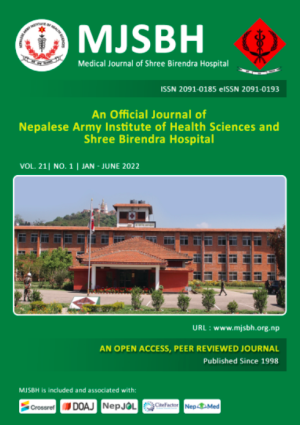Assessment of Knowledge on Basic Life support and Advanced Cardiac Life Support in a Medical College of Kathmandu
Keywords:
ACLS, BLS, Cardio-pulmonary resusitation, TrainingAbstract
Introduction: Basic Life Support (BLS) and Advanced Cardiac Life Support (ACLS) are part of cardio-pulmonary resuscitation. The knowledge of BLS and ACLS is very important in saving lives for healthcare workers for which they need training and updated knowledge on these topics. The aim of the study was to assess the knowledge on BLS and ACLS in a medical college of Kathmandu.
Methods: This was a cross sectional retrospective study conducted in Nepalese Army Institute of Health Sciences. The pretest and posttest scores of the trainees who participated in BLS and ACLS training were analyzed to assess the improvement in the knowledge. The duration of the study was from 1st May 2021 to 31st October 2021 where two sessions of the training were conducted. Data were entered in Microsoft Excel and analysis was done in Statistical Package for Social Sciences version 16.
Results: Out of 72 participants, the mean pretest score was 5.67 ± 1.91 (56.67%) on BLS (Total score 10) and 9.06 ± 2.21 (60.37%) on ACLS (Total score 15). Post-test scores for BLS and ACLS were 8.69 ± 1.03 (86.94%) and 11.43 ± 1.77 (76.20%) respectively. Statistically significant increase in the mean scores were seen in both BLS [df (71) = -13.532, p < 0.001] and ACLS ([df (71) = -9.956, p < 0.001] with 95% CI while comparing pretest BLS and ACLS with posttest BLS and ACLS scores.
Conclusions: Improvement in knowledge was seen amongst participants after the training. This highlights the importance of such training in imparting knowledge regarding BLS and ACLS among healthcare personnel.
Downloads
Downloads
Published
How to Cite
Issue
Section
License
Copyright (c) 2022 Medical Journal of Shree Birendra Hospital

This work is licensed under a Creative Commons Attribution-NonCommercial-NoDerivatives 4.0 International License.
This license enables reusers to distribute, remix, adapt, and build upon the material in any medium or format for noncommercial purposes only, and only so long as attribution is given to the creator.




